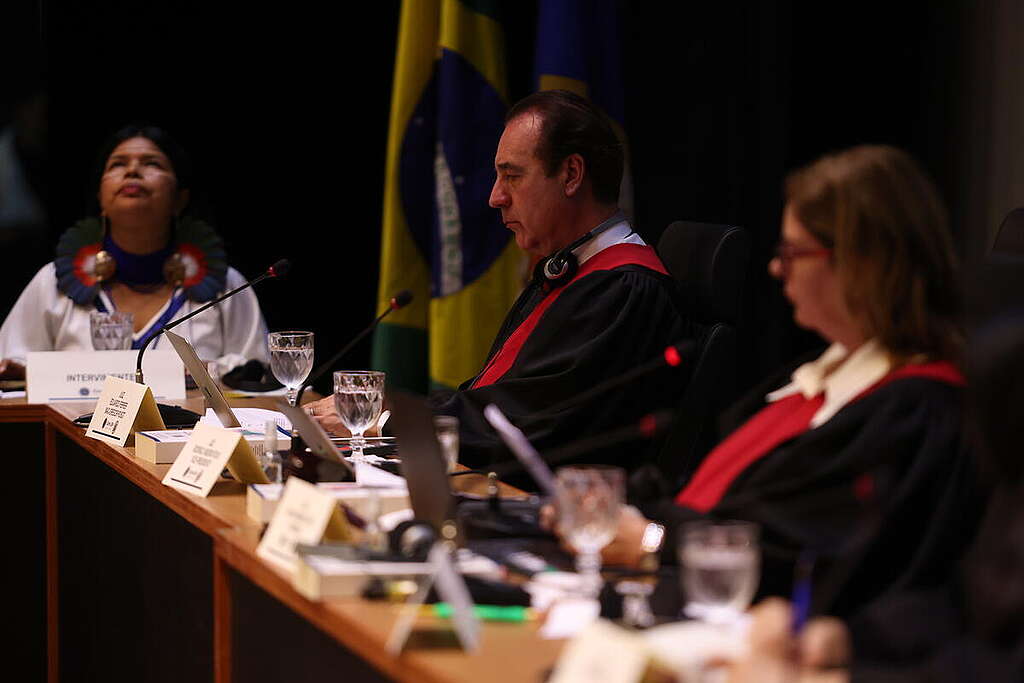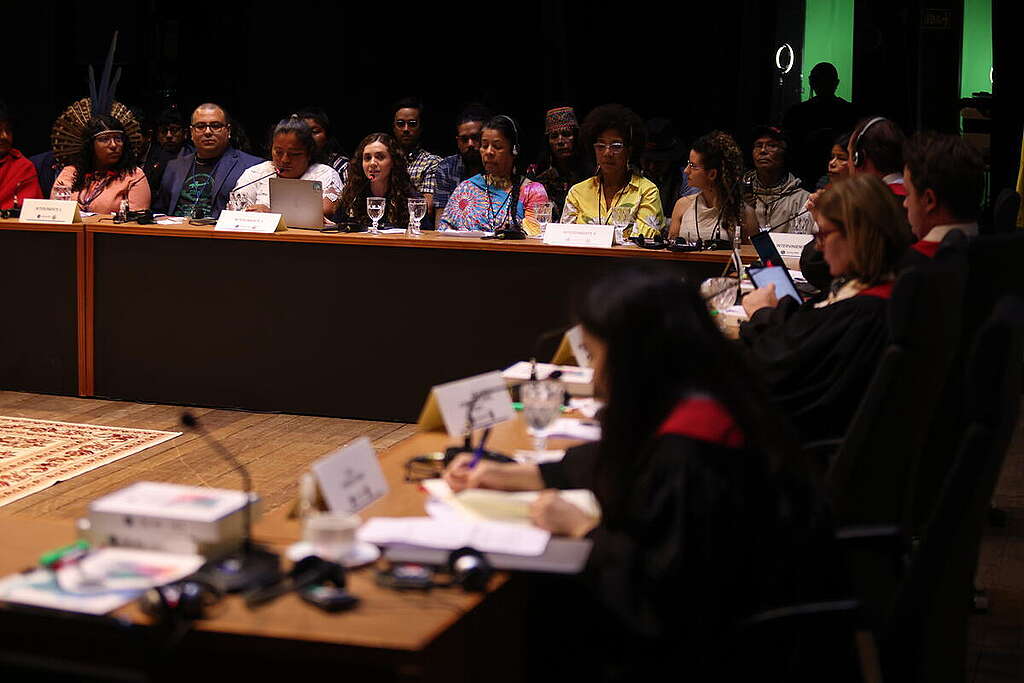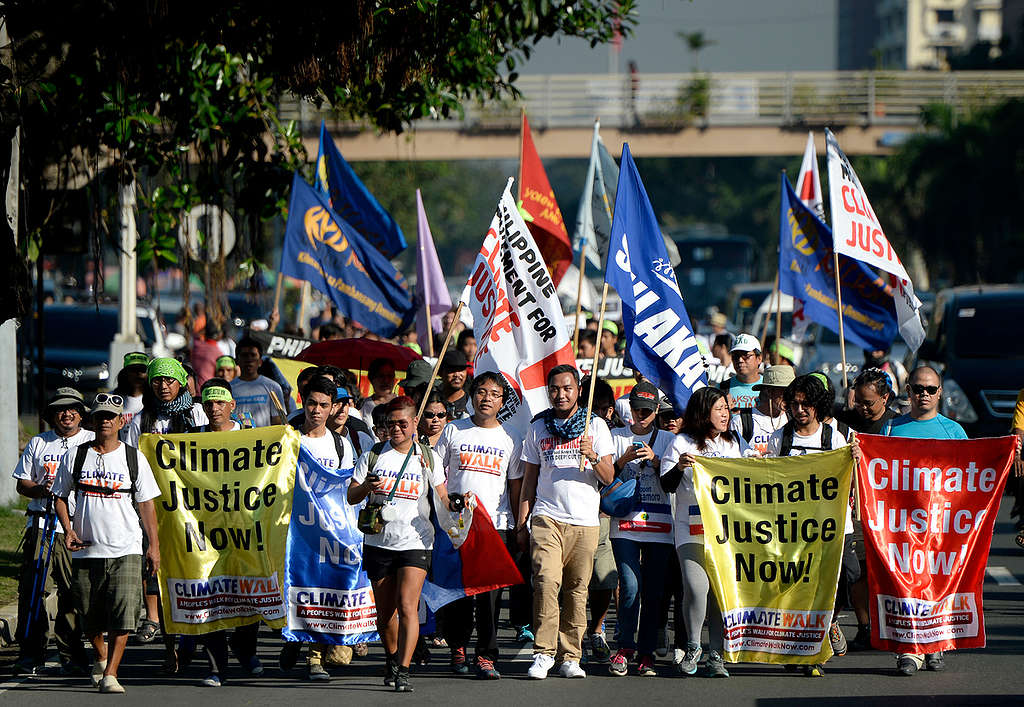That was the question asked by one of the Inter-American Court of Human Rights (IACtHR) judges, the honourable Judge Eduardo Ferrer, to young community members during the first round of hearings of the Advisory Opinion on the climate emergency and human rights that took place in Bridgetown, Barbados. The room, packed with civil society organisations, stood still in silent awe, hopeful, filled with anticipation at what would be answered. We tried to answer the question within ourselves, but also wondered: what would we like to say to those who are suffering the brunt of the climate crisis right now? After nine days of Court hearings, and after listening to countless of stories of impacted communities and pleadings of hundreds of allies and civil society members, including our own delegation, these are the messages we want to deliver.

We reassure those facing the impacts of the climate crisis today that people around the world are working hard to hold those responsible accountable and that authorities are listening. With 265 written observations and over 150 oral interventions, this Advisory Opinion has been the most participatory one in the history of the IACtHR. This demonstrates not only the urgency of the matter, and the important role international tribunals have in the protection of the rule of law, but also the increasing demand for climate justice and leadership of those most impacted by the climate crisis.
At the same time, as Carla Baré, Indigenous Lawyer from Coordenação das Organizações Indígenas da Amazônia Brasileira (COAIB) expressed in her intervention before the Court in Manaos, we acknowledge that many "are not defenders of the environment by choice", but because the climate and biodiversity crises are putting their very existence and ways of living at risk. Indeed, one thing is to watch the news, read the newspapers and hear about the horrors that many are facing as a result of the climate crisis, but a very different thing is to be yourself at the foreground of those impacts. As Aurea Sánchez, community member of El Bosque, the first community to be recognized as climate-displaced by Mexican authorities, told the Court in her oral intervention:
"We lost our house in 2022. Since then my family and I have been living in a tin house (…) without the basic necessities and without enough electricity to refrigerate our food or our insulin (…). But we have not only had material losses. We lost our roots, our neighbours, what made us a community (…) and as if this was not enough, this is not over. (…) The sea used to lull us to sleep but now it wakes us up, it takes away our sleep. That fear of the future that you feel when you hear about climate change, we are living it."

We also recognise that for thousands around the world, climate change is already having catastrophic and, in many cases, irreversible impacts. It is often said that 1.5°C is a temperature "guardrail" that will prevent the worst and most catastrophic impacts of the climate crisis. Although it is clear that 1.5°C is a limit that should not be crossed if we want to prevent far more intense and catastrophic impacts than the ones we are experiencing now, the widespread violation of human rights and environmental destruction that the world is witnessing today as a result of current levels of global warming is already severe enough to prompt ambitious climate action and trigger accountability from governments and corporations.
We affirm that the responsible for this crisis have a name. As Aurea Sánchez told the Court, "For the authorities, we are a problem, but this is not our fault". Research shows that nearly two-thirds of global industrial carbon dioxide and methane emissions since 1751 can be traced to just 90 entities- the carbon majors. Likewise, more than 80% of deforestation and its emissions result from agroindustry commodities-including the production of beef, soy, and palm oil- are caused by a small number of large multinational corporations.
Furthermore, as Dr. Carly Phillips reminded the Court in the Greenpeace International and allies delegation's oral submission, "the fossil fuel industry has long been aware of the risks that their products pose to humanity. By the 1970s and 80s, the industry's own scientists correctly predicted the trajectory of global warming", using this knowledge for their own profit advantage. Publicly however, and to this day, the fossil fuel industry has greatly expanded production of their climate-destructive products and has worked to ensure dependence on fossil fuels by promoting scepticism of climate science, less regulation, and spreading disinformation.
After listening to hundreds of testimonies, we hope one message is clear to the Court: it is not possible to guarantee the effective enjoyment of the right to a clean, healthy and sustainable environment- or of any other human right- without a stable climate. This can only be guaranteed by stopping the expansion, production, sale and combustion of fossil fuels and halting the destruction of natural carbon sinks. The window of opportunity we have to ensure climate stability is closing. As the Greenpeace International and allies delegation demanded of the Court, governments and large corporations' legacy of impunity must come to an end.
To answer the question of honourable Judge Ferrer, co-plaintiff Kalālapaikuanalu Winter, one of 14 youths who sued and won a historic settlement against the Hawaii Department of Transportation over the operation of a transport system in a case supported by Our Children's Trust and Earthjustice, said "If I could talk to the future generations, I would tell them that there are people fighting for them and that we are fighting for them and that their lives matter and their rights matter.
We agree with Kalālapaikuanalu Winter. If we could talk to future generations, we would want them to know we are here fighting to safeguard their rights; we are fighting so they can enjoy a stable climate, one that doesn't take away their dreams and doesn't force them to resist and seek justice for the protection of their most fundamental freedoms and rights; we are fighting to bring accountability to those most responsible for this crisis and to set a precedent that private and greedy interests cannot ever again be more important than the existence and well-being of human beings and nature.
What would you say to future generations?
It's time for all of us to assert our rights, demand climate justice, and a dignified way of life.
Michelle Jonker-Argueta is Senior Legal Counsel Strategic Litigation at Greenpeace International
Maria Alejandra Serra is Legal Counsel, Climate Justice and Liability at Greenpeace International







